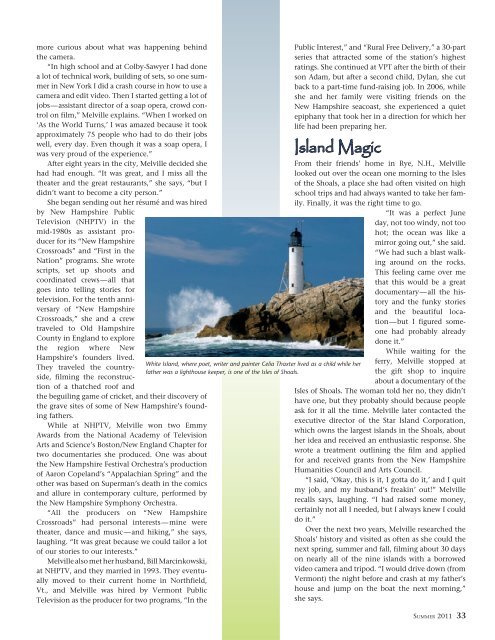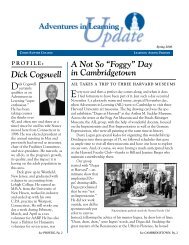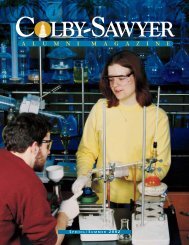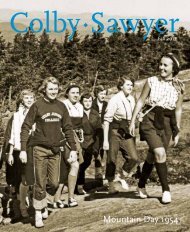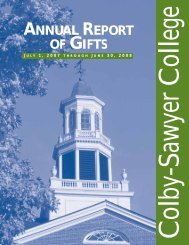A L U M N I M A G A Z I N E - Colby-Sawyer College
A L U M N I M A G A Z I N E - Colby-Sawyer College
A L U M N I M A G A Z I N E - Colby-Sawyer College
Create successful ePaper yourself
Turn your PDF publications into a flip-book with our unique Google optimized e-Paper software.
more curious about what was happening behind<br />
the camera.<br />
“In high school and at <strong>Colby</strong>-<strong>Sawyer</strong> I had done<br />
a lot of technical work, building of sets, so one summer<br />
in New York I did a crash course in how to use a<br />
camera and edit video. Then I started getting a lot of<br />
jobs—assistant director of a soap opera, crowd control<br />
on film,” Melville explains. “When I worked on<br />
‘As the World Turns,’ I was amazed because it took<br />
approximately 75 people who had to do their jobs<br />
well, every day. Even though it was a soap opera, I<br />
was very proud of the experience.”<br />
After eight years in the city, Melville decided she<br />
had had enough. “It was great, and I miss all the<br />
theater and the great restaurants,” she says, “but I<br />
didn’t want to become a city person.”<br />
She began sending out her résumé and was hired<br />
by New Hampshire Public<br />
Television (NHPTV) in the<br />
mid-1980s as assistant producer<br />
for its “New Hampshire<br />
Crossroads” and “First in the<br />
Nation” programs. She wrote<br />
scripts, set up shoots and<br />
coordinated crews—all that<br />
goes into telling stories for<br />
television. For the tenth anniversary<br />
of “New Hampshire<br />
Crossroads,” she and a crew<br />
traveled to Old Hampshire<br />
County in England to explore<br />
the region where New<br />
Hampshire’s founders lived.<br />
They traveled the countryside,<br />
filming the reconstruction<br />
of a thatched roof and<br />
the beguiling game of cricket, and their discovery of<br />
the grave sites of some of New Hampshire’s founding<br />
fathers.<br />
While at NHPTV, Melville won two Emmy<br />
Awards from the National Academy of Television<br />
Arts and Science’s Boston/New England Chapter for<br />
two documentaries she produced. One was about<br />
the New Hampshire Festival Orchestra’s production<br />
of Aaron Copeland’s “Appalachian Spring” and the<br />
other was based on Superman’s death in the comics<br />
and allure in contemporary culture, performed by<br />
the New Hampshire Symphony Orchestra.<br />
“All the producers on “New Hampshire<br />
Crossroads” had personal interests—mine were<br />
theater, dance and music—and hiking,” she says,<br />
laughing. “It was great because we could tailor a lot<br />
of our stories to our interests.”<br />
Melville also met her husband, Bill Marcinkowski,<br />
at NHPTV, and they married in 1993. They eventually<br />
moved to their current home in Northfield,<br />
Vt., and Melville was hired by Vermont Public<br />
Television as the producer for two programs, “In the<br />
Public Interest,” and “Rural Free Delivery,” a 30-part<br />
series that attracted some of the station’s highest<br />
ratings. She continued at VPT after the birth of their<br />
son Adam, but after a second child, Dylan, she cut<br />
back to a part-time fund-raising job. In 2006, while<br />
she and her family were visiting friends on the<br />
New Hampshire seacoast, she experienced a quiet<br />
epiphany that took her in a direction for which her<br />
life had been preparing her.<br />
Island Magic<br />
From their friends’ home in Rye, N.H., Melville<br />
looked out over the ocean one morning to the Isles<br />
of the Shoals, a place she had often visited on high<br />
school trips and had always wanted to take her family.<br />
Finally, it was the right time to go.<br />
“It was a perfect June<br />
day, not too windy, not too<br />
hot; the ocean was like a<br />
mirror going out,” she said.<br />
“We had such a blast walking<br />
around on the rocks.<br />
This feeling came over me<br />
that this would be a great<br />
documentary—all the history<br />
and the funky stories<br />
and the beautiful location—but<br />
I figured someone<br />
had probably already<br />
done it.”<br />
While waiting for the<br />
White Island, where poet, writer and painter Celia Thaxter lived as a child while her ferry, Melville stopped at<br />
father was a lighthouse keeper, is one of the Isles of Shoals.<br />
the gift shop to inquire<br />
about a documentary of the<br />
Isles of Shoals. The woman told her no, they didn’t<br />
have one, but they probably should because people<br />
ask for it all the time. Melville later contacted the<br />
executive director of the Star Island Corporation,<br />
which owns the largest islands in the Shoals, about<br />
her idea and received an enthusiastic response. She<br />
wrote a treatment outlining the film and applied<br />
for and received grants from the New Hampshire<br />
Humanities Council and Arts Council.<br />
“I said, ‘Okay, this is it, I gotta do it,’ and I quit<br />
my job, and my husband’s freakin’ out!” Melville<br />
recalls says, laughing. “I had raised some money,<br />
certainly not all I needed, but I always knew I could<br />
do it.”<br />
Over the next two years, Melville researched the<br />
Shoals’ history and visited as often as she could the<br />
next spring, summer and fall, filming about 30 days<br />
on nearly all of the nine islands with a borrowed<br />
video camera and tripod. “I would drive down (from<br />
Vermont) the night before and crash at my father’s<br />
house and jump on the boat the next morning,”<br />
she says.<br />
SUMMER 2011 33


